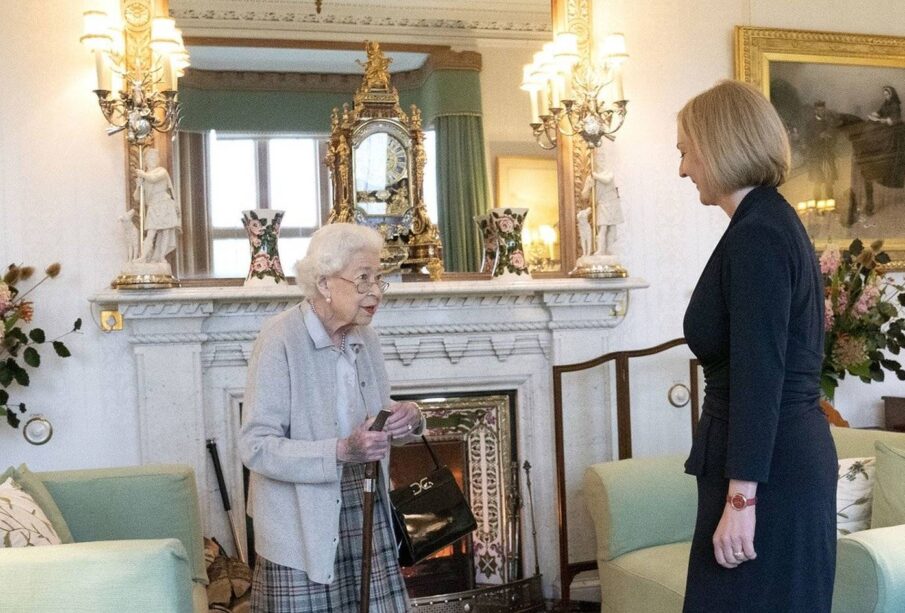Liz Truss becomes Britain’s new prime minister
 Britain's Queen Elizabeth II, left, welcomes Liz Truss during an audience at Balmoral, Scotland, where she invited the newly elected leader of the Conservative party to become Prime Minister and form a new government, Tuesday, Sept. 6, 2022. (Jane Barlow/Pool Photo via AP)
Britain's Queen Elizabeth II, left, welcomes Liz Truss during an audience at Balmoral, Scotland, where she invited the newly elected leader of the Conservative party to become Prime Minister and form a new government, Tuesday, Sept. 6, 2022. (Jane Barlow/Pool Photo via AP)Queen Elizabeth appointed Liz Truss as British prime minister on Tuesday, tasked with steering the country through a looming recession and energy crisis that threatens the futures of millions of households and businesses.
Truss, the fourth Conservative prime minister in six years, flew to the royal familiy’s Scottish home to be asked by the 96-year-old monarch to form a government. She replaces Boris Johnson, who was forced to quit after three tumultuous years in power.
“The Queen received in Audience The Right Honourable Elizabeth Truss MP today and requested her to form a new Administration,” Buckingham Palace said in a statement.
“Ms Truss accepted Her Majesty’s offer and kissed hands upon her appointment as Prime Minister and First Lord of the Treasury.”
Truss will confront one of the most daunting lists of problems of any post-war leader in Britain as inflation hits double digits, the cost of energy soars and the Bank of England warns of a lengthy recession by the end of this year.
Her plan to boost the economy through tax cuts while also potentially providing around 100 billion pounds ($116 billion) to cap energy costs has already rattled financial markets, prompting investors to dump the pound and government bonds in recent weeks.
She also enters the latest crisis to buffet Britain with a weaker political hand than many of her predecessors after she defeated rival Rishi Sunak in a vote of Conservative Party members by a tighter margin than expected, and with more of the party’s lawmakers initially backing her rival.
Johnson, who tried to cling on to power in July despite ministers resigning en masse over a series of scandals, told reporters and politicians gathered in Downing Street early on Tuesday that the time had come for the country to unite.
“This is it folks,” Johnson said in his farewell speech. “What I say to my fellow Conservatives, it’s time for politics to be over, folks. It’s time for us all to get behind Liz Truss and her team and her programme.”
After speaking outside the famous black door, he left London to travel to northeast Scotland and tender his resignation to the queen before Truss followed him into Balmoral Castle to be asked to replace him.
Johnson used his departure speech to boast of his successes, including an early vaccine programme during the coronavirus pandemic and his early support for Ukraine in its battle against Russia.
He also listed “delivering Brexit” as one of his main achievements, although polls now show that a majority of people think leaving the European Union was a mistake.
CHANGING THE RULES
Johnson’s speech was full of the bombast and jokes characteristic of a man once loved by much of the British public but also loathed by many. He has refused to show any remorse over the scandals that brought him down, including “Partygate”, a series of boozy gatherings in Downing Street while the country was under COVID-19 lockdown, for which he was fined by police.
Britain, under Conservative rule since 2010, has stumbled from crisis to crisis in recent years and there is now the prospect of a long energy emergency that could drain the savings of households and threaten the futures of smaller businesses that are still weighed down by COVID-era loans.
Household energy bills are due to jump by 80% in October, but a source familiar with the situation has told Reuters that Truss may freeze bills in a plan that could cost towards 100 billion pounds, surpassing the COVID-19 furlough scheme.
It is not clear how Britain will pay for the support. Government-backed loans to energy suppliers, repaid either by levies on future bills or via general taxation, are being considered according to the source.
But the scale of the package, plus the fact the energy crisis could run for a couple of years, has spooked investors.
The pound has fared worse against the U.S. dollar than most other major currencies recently.
In August alone sterling shed 4% against the greenback and it marked the worst month for 20-year British government bonds since around 1978, according to records from Refinitiv and the Bank of England.
Britain’s public finances also remain weighed down by the government’s huge coronavirus spending spree. Public debt as a share of economic output is not far off 100%, up from about 80% before pandemic.
SOURCE: REUTERS










